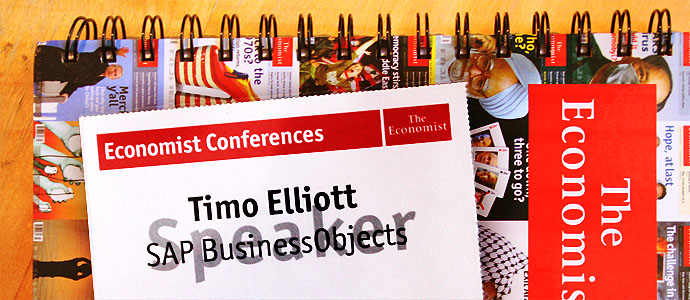
I presented yesterday evening at an executive dinner forum for CIOs at Claridge’s in London. The event was part of The Economist Conferences’ CIO and Technology Leaders forum, which brought together CIOs from a diverse range of companies including Rentokil, Rolls-Royce, the Salvation Army, Tube Lines, BAA, and Aston Martin Lagonda.
 Carla Rapoport of the Economist Intelligence Unit (EIU) took the attendees through the highlights of a new study of CIO attitudes: Staying the Course? Technology Decision-Making in Turbulent Times, and Royce Bell, CEO of Accenture Information Management Services talked entertainingly about the importance—and limitations—of today’s management information systems.
Carla Rapoport of the Economist Intelligence Unit (EIU) took the attendees through the highlights of a new study of CIO attitudes: Staying the Course? Technology Decision-Making in Turbulent Times, and Royce Bell, CEO of Accenture Information Management Services talked entertainingly about the importance—and limitations—of today’s management information systems.
The main speaker was Jeremy Vincent, CIO of Jaguar Land Rover, who outlined how his organization was coping with the current economic crisis, and explained that increasing IT maturity means “CIOs have more of an opportunity to influence other senior executives than ever before.”
Discussions over dinner were led by Denis McCauley, director of Global Technology Research for the EIU. Attendees were asked if there was an opportunity for CIOs to take advantage of the current conditions, because “a crisis is too good a thing to waste.”
It was clear that the attendees represented a very diverse range of reactions to the current conditions, both in severity (some organizations were merely experiencing slower growth, while others had seen revenue drop by 50%) and in timing (one organization had a product lifecycle that lasted several decades and would not feel any direct effects for several years).
Those who weren’t suffering large cuts in their budget questioned whether there should be any change in strategy at all (because a strategic approach should have a longer-term horizon), while those who had experienced deeper cuts had had to make big changes.
Consensus answers from the group included:
- There is an opportunity to strengthen IT teams because layoffs have meant more well-qualified (and reasonably-priced) people are available on the market.
- Since capital expenditures have been sharply curtailed, there’s an opportunity to review business processes and systems. One attendee likened his company to a gliding swan – everything looks graceful, but a furious amount of paddling was still required below the surface, and he was using this “time off from growth” to set his house in order.
- Systems should be simplified as much as possible so that the organization is more agile for future growth. Once example given was a credit-approval process that had grown increasingly more complex over a series of company acquisitions. Not only was now a good time to simplify the process, but also faster customer credit approval could be a significant competitive differentiator under the current economic conditions.
- It’s not always about standardization and having “one system” – one company was in the midst of selling a large part of their business, and had to painfully separate the existing systems into two, after years of centralization.
- The current climate was a good opportunity to prune the portfolio of IT projects and push through other initiatives that would be politically more difficult in a context of general growth
Overall, the discussions were lively, sincere, and good-hearted, and the wine and food excellent. I’m obviously not a CIO, but on based on the reactions I saw, if you are one, you should consider attending one of the Economist’s events.
